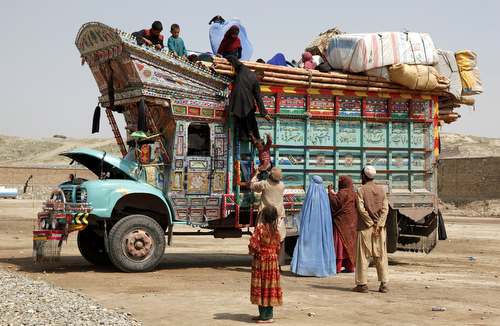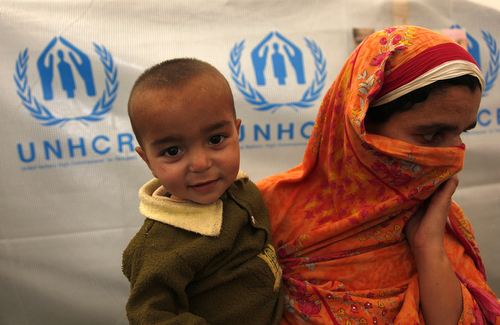KABUL - The UN refugee agency, in close collaboration with the Governments of Afghanistan, Iran and Pakistan, expects to agree on a joint resource mobilization strategy for the Afghan refugee situation – the world’s largest and most protracted refugee situation – in the coming days.
“It stresses the need for engaging more donors in order to benefit the maximum number of refugees, returnees and host communities,” the Office of the UN high Commissioner for Refugees (UNHCR), added in a joint press release.
The UN agency and the three governments issued the release in the wake of a two-day meeting of the regional Quadripartite Steering Committee, held 18-19 September in the Pakistani capital of Islamabad, to discuss the implementation of the Solution Strategy for Afghan Refugees (SSAR).
Endorsed in Geneva at an international conference in May 2012, the overall purpose of the SSAR is to support the voluntary repatriation of Afghan refugees, their sustainable reintegration in Afghanistan, and provide assistance to the key host countries of Iran and Pakistan, including increases in third country resettlement.
The number of returned Afghans since 2001 constitutes nearly a quarter of the entire population.
In the past decade, some 5.7 million Afghan refugees have returned to Afghanistan in the world’s largest repatriation operation. Nevertheless, a 40 per cent decrease has been observed in return trends this year. There are still 2.4 million Afghan refugees in Pakistan and Iran – with 1.6 million and 840,000 refugees in each country, respectively. The two are the largest refugee hosting countries globally.
The meeting was the third such gathering of the regional Quadripartite Steering Committee. In addition to discussing ways of conducting joint resource mobilization, delegates also discussed ways and means for establishing stronger cooperation and partnership with the international community to resolve the Afghan refugee situation.
Those in attendance for the United Nations included the Secretary-General’s Deputy Special Representative and Resident Coordinator in Afghanistan, Mark Bowden, UNHCR’s Director of the Regional Bureau for Asia and the Pacific, Daisy Dell, UNHCR’s Deputy Director of the Bureau for Asia and the Pacific, Indrika Ratwatte, as well as UNHCR Country Representatives from Afghanistan, Iran and Pakistan.
Pakistan’s Minister for States and Frontier Regions, Lt. Gen. (Retd.) Abdul Qadir Baloch, chaired the meeting. Others attending included the Afghan Minister of Refugees and Repatriation, Dr. Jamaher Anwary, and Iran’s Director General of the Bureau of Aliens and Foreign Immigrants, Aziz Kazemi.
The delegates from the three countries, their respective National Steering Committees and UNHCR presented updates on progress and challenges in implementing the SSAR, and discussed various approaches on how to jointly mobilize resources for the implementation of a regional strategy.
According to the joint press release, while it has been agreed that the preferred solution for refugees remains dignified voluntary return, the participants acknowledged that voluntary repatriation of refugees could only be sustainable when conditions inside Afghanistan are conducive for reintegration.
“More funds and rigorous efforts are required to achieve the SSAR goals, which include improving services especially in the areas of education and livelihood, so that more refugees can return and start a new life,” the participants reportedly agreed.
In his remarks, Pakistan’s Minister Baloch reassured participants about his country’s commitment to the principle of voluntary and dignified return of Afghan refugees, in accordance with international norms. However, he also made it clear that the solution to this protracted issue lies in Afghanistan, and all out efforts are required to be undertaken to ensure international assistance for voluntary returns and reintegration in Afghanistan.
Afghanistan’s Minister Anwary hailed the Governments of Iran and Pakistan for their long-term support and hosting of Afghan refugees. He noted that more developmental assistance is required to make a real impact and enable the sustainable reintegration of Afghans.
He also told the forum about the Afghan Government’s administration of five National Priority Programmes related to the refugee situation, adding that “in situations where national development programmes cannot cover all the needs of returnees, UN agencies and other development actors must do more to fill the gaps.”
Addressing the gathering, Iran’s Dr. Kazemi stated that the dignified return of Afghan refugees remains the preferred solution. He hoped that challenges “such as the lack of shelter, job opportunities, educational and health facilities in Afghanistan could be addressed through sharing costs and responsibilities for SSAR projects specifically targeting areas of high return.”
“There should be more support from the international community and strong partnership between UN agencies and NGOs (non-governmental organizations) for voluntary repatriation and implementation of projects in the Islamic Republic of Iran,” he added.
UNHCR’s Ms. Dell expressed gratitude to the three governments for their commitment to solutions for Afghan refugees and reiterated the United Nations’ ongoing willingness to assist governments in the implementation of the strategy.
She also stressed that a regional approach remains the best framework to meet the significant challenges faced by the three governments and UNHCR in seeking an end to the world’s largest and most protracted refugee situation, especially at a time when other humanitarian crises demand additional donor support.








